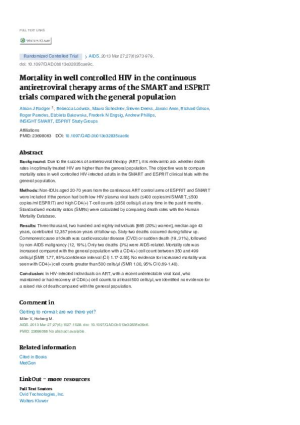Ontario Manuel de poursuite de la couronne D. 33 Infractions d’ordre sexuel contre les adultes
Lignes directrices pour les procureurs en Ontario, au Canada, sur les poursuites pour infractions d'ordre sexuel contre les adultes. Ces lignes directrices ne sont pas assez protectrices selon les militants canadiens contre la pénalisation du VIH.
Mortality in well controlled HIV in the continuous antiretroviral therapy arms of the SMART and ESPRIT trials compared with the general population
Compares mortality rates in well controlled HIV-infected adults in two clinical trials with the general population. Found that HIV-infected individuals on ART with a recent undetectable viral load, who maintained or had recovery of CD4(+) cell counts to at least 500 cells/μl, had no increased risk of death compared with the general population.


